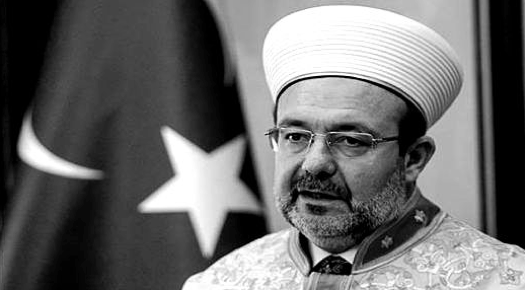
Head of Turkey’s state-operated Presidency of Religious Affairs (Mehmet Gormez) met with Iran’s Supreme Leader (Ayatollah Ali Khamenei) last month to discuss Turkish efforts for sectarian unity. He told the media that he had conveyed Turkey’s call to Iran to act in unity with Saudi Arabia and end the divide in the Muslim world.
“I told Mr. Khamenei that it is Muslims' duty to stop the bloodshed and suffering in the region and drop the sectarian view of the Syrian crisis,” he said. “I told him that it will be beneficial to end the disintegrated, divided state of the Islamic world if Turkey, Iran and Saudi Arabia cooperate and act in unity.”
Gormez also serves as the chairman of Permanent Contact Group of Islamic Scholars Peace, Moderation and Common Sense Initiative. The group was founded by Islamic scholars, including those from Iran who traveled to Istanbul in July 2014 after DAESH (an acronym for the Arabic phrase ‘al-Dawla al-Islamiya al-Iraq al-Sham’ –another name for ISIS) carried out horrifying terrorist attacks. These attacks emerged as a serious threat to Islam since DAESH had made use of religion as a tool to terrorize innocent people.
This time around, Gormez was visiting Tehran for a series of events, including a global conference on Islamic unity. Even though Turkey and Iran share close ties, both countries differ on Syria, with the former demanding a transition of power without Syrian President Bashar Assad and the latter defending his rule.
“Instead of speaking unity in conference halls, we should show how it is maintained,” Görmez said after his meeting with the Khamenei. “Suffering in Syria is a shared pain for everyone. It is wrong to see it through a sectarian view.”
Gormez elucidated that Muslim countries have been undergoing hard times since militant groups, like DAESH, are increasingly using Islam to wreck havoc now than ever before.
“We have to separate political, cultural, economic and social matters stemming from other factors from religion and not blame it for all these problems. Thus, we can prevent sectarian strife. There is not a conflict between Shiites and Sunnis. It is, rather, a conflict between movements, which call themselves religious and commit violence, and the main path of Islam,” he said.
Gormez said that he initially had inhibitions about attending the conference on sectarian unity in Iran but he clarified how his sentiments changed upon seeing all Iranians interested in his call to prevent sectarian strife. Reportedly, Gormez decided to follow through with his visit after consulting President Recep Tayyip Erdogan and Prime Minister Ahmet Davutoglu.
“I am glad to see scholars here do not advocate a narrow sectarian view of problems the Islamic world faces,” he said.
After visiting Iran, Gormez made with a similar trip to Saudi Arabia on January 2, where he reportedly discussed the deepening rift between Sunnis and Shiite Muslims.
Photo Credits: Hurriyet Daily News
